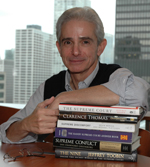Inside the Scalia Interview

Richard Brust
Like any public building before the crowds come, the U.S. Supreme Court at 8 on a rainy March morning is quiet as a tomb. Two janitors holding Styrofoam coffee cups roam the hallways. One clutches a folded newspaper. In the cafeteria, a man wearing a blue jacket works the cash register, as another employee approaches. She is the only person at the counter.
I am brought to a spacious room with pea-green carpeting and couches and chairs placed against the walls. The large windows open to a courtyard, puddled as rain strikes. It is the Lawyers’ Lounge, and I’m awaiting Justice Antonin Scalia.
The justice consented to a half-hour interview, the conversation to be limited to the book, Making Your Case, which he co-wrote with Bryan Garner, a legal writing expert who is editor of Black’s Law Dictionary. Garner will be on a teleconference line, and in preparation we chat by phone earlier in the week.
But the main purpose, the reason to travel from Chicago to Washington, D.C., is Scalia.
I’ve heard him question litigators from the bench, and I’ve read the press reports, the law review articles and the opinions. I deem him garrulous, irascible, brilliant, humorous. He seems to enjoy taunting reporters and questioning counsel while simultaneously hinting of his predilections to the other justices.
As for the written word, few have mastered the judicial opinion—especially the dissent—so eloquently. And few have allowed so much of their personalities to emerge from the page.
I also have digested his other writings, including A Matter of Interpretation, in which he lays out his judicial philosophy of textualism, meaning that a document is to be assessed by its words alone. No plumbing the Congressional Record to glean the legislation’s history for him. Oh, yes, and I read the galleys of his and Garner’s book.
The interview is to be recorded—a bit of a shock to my system. I am not the most polished speaker—my voice sounds nasal to my ears and I’m told it trails off. Nor am I the most proficient at technology, and I practice again and again setting the buttons on the H2 Zoom digital recorder that our Web editor purchased. If anything makes me nervous, that does.
In the Lawyers’ Lounge I fiddle one last time with the recorder, watching the lines indicating volume jump back and forth. I envy TV and radio reporters who get to take their producers with them. I guess I’m ready.
In walks the justice, accompanied by the court’s public information officer, Kathy Arberg. Scalia is wearing a navy suit and gold tie. My first impression is that he is not as tall or stocky as he seems enrobed and from the distance of the press box to the courtroom bench.
The justice settles into his chair and pours a glass of water. I press the button on the recorder and we begin.
I start by telling him that my training as a journalist did not include podcasting and he chuckles at that. “Podcasting,” he repeats.
We swing into the interview and off we go. Scalia is cordial, pleasant even. I wonder if he’s setting a trap. Or maybe his way is to start on his best behavior and see where that takes him.
But as the interview proceeds—with me trying to balance the conversation among myself, Scalia and Garner, my eyes jumping all the while between the recorder and my scripted questions—I find him easy to talk to.
I get comfortable with his wisecracking. It lands on my ears like the banter of a New Yorker—the city where both he and I grew up. It’s familiar.
I play this game of describing people I meet by imagining who I would cast in a movie. It occurs to me that the part of Scalia would have gone to Vincent Gardenia, the late great character actor whose most celebrated role is the father in Moonstruck.
At points in the interview I nudge the justice away from topics in the book. He goes only so far, and then pulls back. “I’ll pass,” he says when I ask about the ABA. “I have no idea,” he responds to my question about how litigators appraise him.
On the other hand, when the topics turn to the Supreme Court bar, how he wants lawyers to answer his questions, and what they should be teaching in law school, Scalia is verbose. I’m appreciative—my fears of his totally clamming up evaporate.
As the interview comes to an end, I tell the justice—and I’m quite sincere about this—that I enjoyed talking with him.
I also needle him—one New Yorker to another—that he should be kinder to journalists, that as a writer and editor I, too, love literature and I value books on writing.
“You’re the exception to the rule,” he says, and smiles as he leaves the room.
Additional coverage:
Exclusive ABA Journal interview



